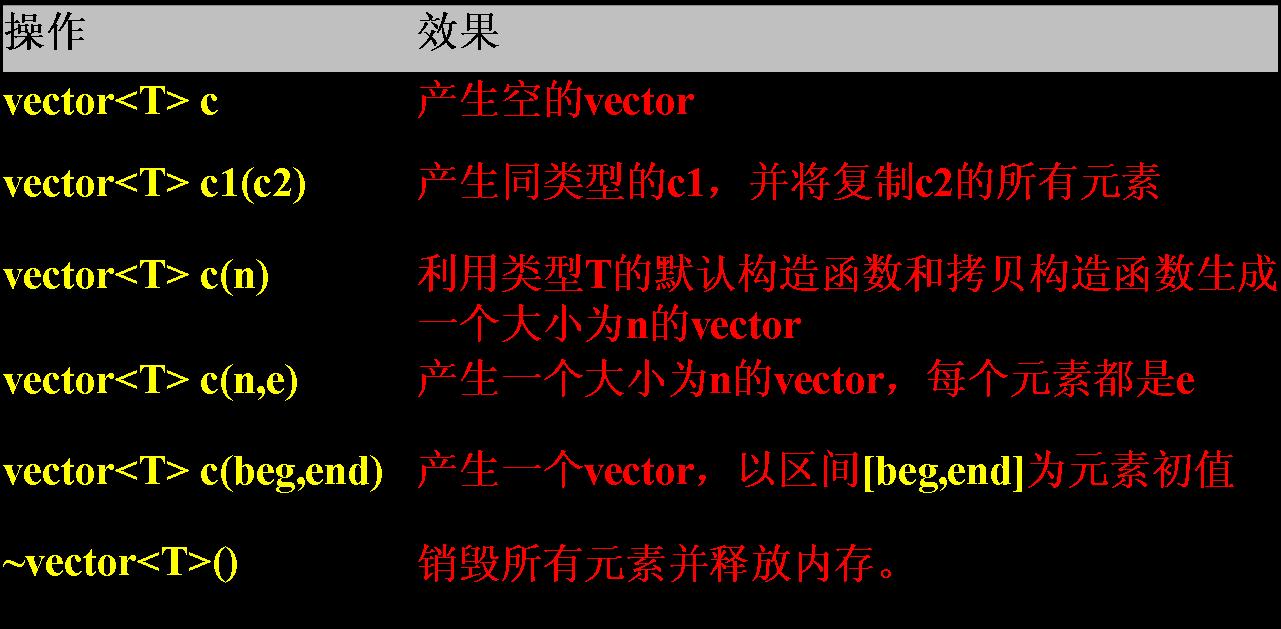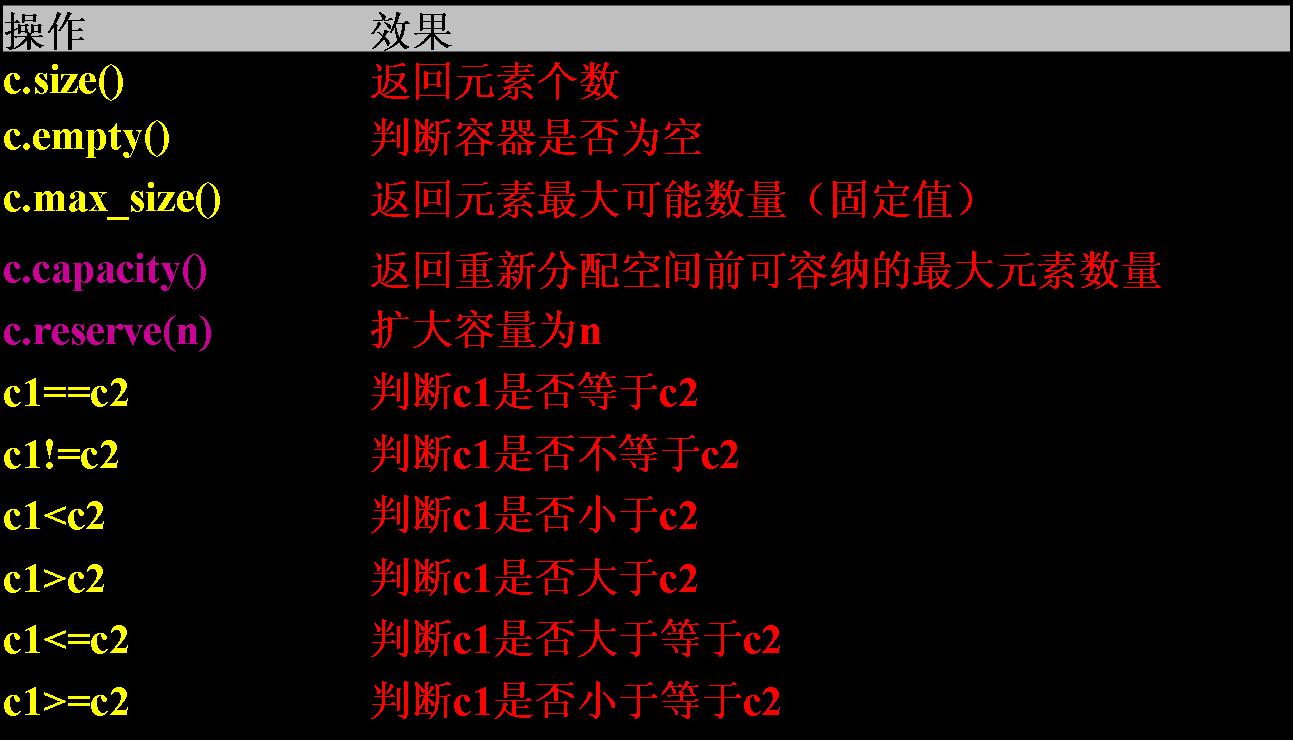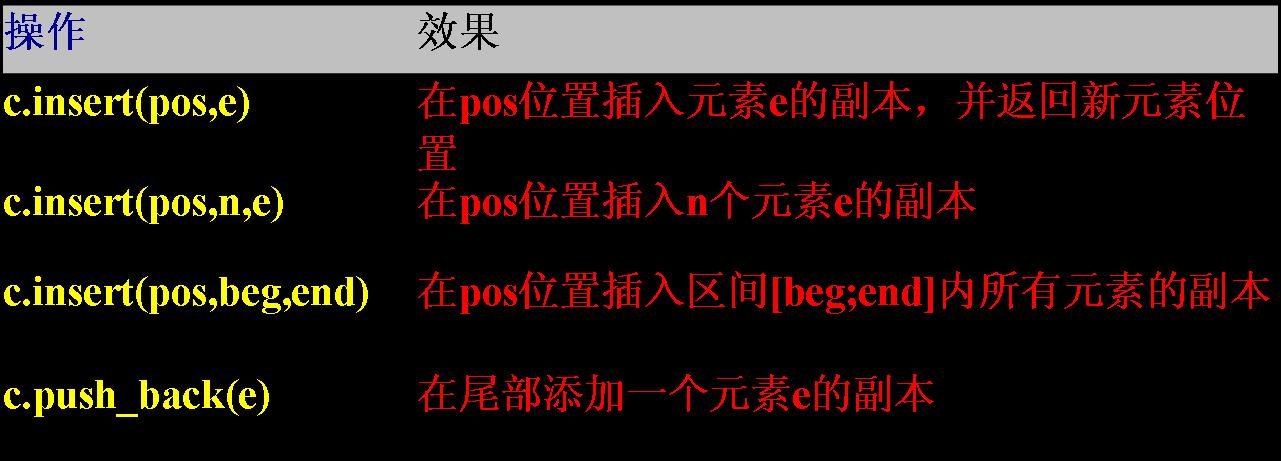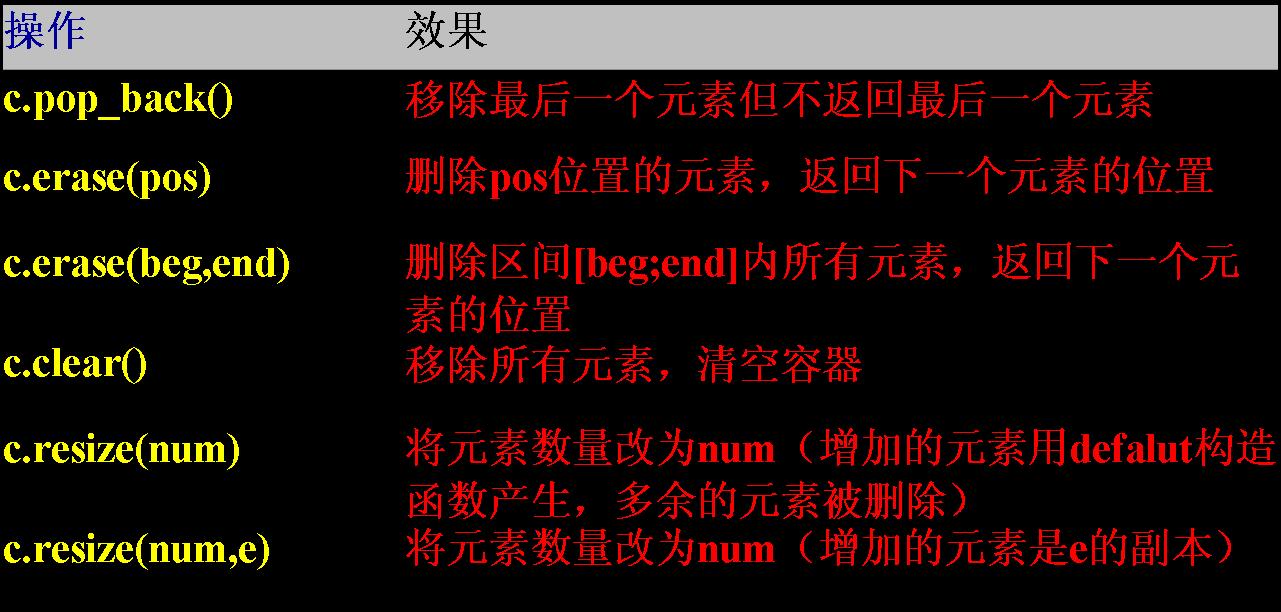标准模板库(STL)学习指南之vector向量
拷贝构造函数和重载的赋值操作符)
三.必须包含的头文件#include <vector>
capacity返回vector能容纳的元素最大数量。如果插入元素时,元素个数超过capacity,
需要重新配置内部存储器。

->构造、拷贝和析构

->非变动操作

eg.

vector<int> v1(10);
cout << "The capacity of v1 is " << v1.capacity() << endl;
cout << "The size of v1 is " << v1.size() << endl;
vector<int> v2;
v2.reserve(20);
cout << "The capacity of v2 is " << v2.capacity() << endl;
cout << "The size of v2 is " << v2.size() << endl;
output :
The capacity of v1 is 10
The size of v1 is 10
The capacity of v2 is 20
The size of v2 is 0

->赋值操作

所有的赋值操作都有可能调用元素类型的默认构造函数,拷贝构造函数,赋值操作符和析构函数
如:
eg.

vector<int> v;
v.assign( 10, 42 );
for( vector<int>::size_type i = 0; i < v.size(); i++ ) {
cout << v[i] << " ";
}
cout << endl;
OutPut :
42 42 42 42 42 42 42 42 42 42
vector<int> v1;
for( int i = 0; i < 10; i++ ) {
v1.push_back( i );
}
vector<int> v2;
v2.assign( v1.begin(), v1.end() );
for( vector<int>::size_type i = 0; i < v2.size(); i++ ) {
cout << v2[i] << " ";
}
cout << endl;
output :
0 1 2 3 4 5 6 7 8 9

元素存取

下面的操作是错误的:
std::vector<T> v;//empty
eg.

string str;
while( cin >> str ) words.push_back(str);
sort( words.begin(), words.end() );
cout << "In alphabetical order, the first word is '" << words.front() << "'." << endl;
假设输入是: now is the time for all good men to come to the aid of their country
output:
In alphabetical order, the first word is 'aid'.
vector<int> v;
for( int i = 0; i < 5; i++ ) {
v.push_back(i);
}
cout << "The first element is " << v.front()
<< " and the last element is " << v.back() << endl;
output:
The first element is 0 and the last element is 4

迭代器相关函数

使用迭代器时应注意:
迭代器持续有效,除非发生以下两种情况:
eg.

vector<string> words;
string str;
while( cin >> str ) words.push_back(str);
for( vector<string>::const_iterator iter = words.begin();
iter != words.end(); ++iter ) {
cout << *iter << endl;
}
假设输入是 : hey mickey you're so fine
output:
hey
mickey
you're
so
fine

插入(insert)元素

eg.

vector<char> alphaVector;
for( int i=0; i < 10; i++ ) {
alphaVector.push_back( i + 'A' );
}
// Insert four C's into the vector
vector<char>::iterator theIterator = alphaVector.begin();
alphaVector.insert( theIterator, 4, 'C' );
// Display the vector
for( theIterator = alphaVector.begin(); theIterator != alphaVector.end(); ++theIterator ) {
cout << *theIterator;
}
output:
CCCCABCDEFGHIJ
vector<int> v1;
v1.push_back( 0 );
v1.push_back( 1 );
v1.push_back( 2 );
v1.push_back( 3 );
vector<int> v2;
v2.push_back( 5 );
v2.push_back( 6 );
v2.push_back( 7 );
v2.push_back( 8 );
cout << "Before, v2 is: ";
for( vector<int>::size_type i = 0; i < v2.size(); i++ ) {
cout << v2[i] << " ";
}
cout << endl;
v2.insert( v2.end(), v1.begin(), v1.end() );
cout << "After, v2 is: ";
for( vector<int>::size_type i = 0; i < v2.size(); i++ ) {
cout << v2[i] << " ";
}
cout << endl;
output :
Before, v2 is: 5 6 7 8
After, v2 is: 5 6 7 8 0 1 2 3


eg.

vector<char> alphas;
for( int i=0; i < 10; i++ ) {
static const char letters[] = "ABCDEFGHIJ";
alphas.push_back( letters[i] );
}
vector<char>::size_type size = alphas.size();
vector<char>::iterator startIterator;
vector<char>::iterator tempIterator;
for( vector<char>::size_type i=0; i < size; i++ ) {
startIterator = alphas.begin();
alphas.erase( startIterator );
// Display the vector
for( tempIterator = alphas.begin(); tempIterator != alphas.end(); ++tempIterator ) {
cout << *tempIterator;
}
cout << endl;
}
output:
BCDEFGHIJ
CDEFGHIJ
DEFGHIJ
EFGHIJ
FGHIJ
GHIJ
HIJ
IJ
J
vector<char> alphas;
for( int i=0; i < 10; i++ ) {
static const char letters[] = "ABCDEFGHIJ";
alphas.push_back( letters[i] );
}
// display the complete vector
for( vector<char>::size_type i = 0; i < alphas.size(); i++ ) {
cout << alphas[i];
}
cout << endl;
// use erase to remove all but the first two and last three elements
// of the vector
alphas.erase( alphas.begin()+2, alphas.end()-3 );
// display the modified vector
for( vector<char>::size_type i = 0; i < alphas.size(); i++ ) {
cout << alphas[i];
}
cout << endl;
output:
ABCDEFGHIJ
ABHIJ
#include <iostream>
#include <vector>
#include <iterator>
using namespace std;
int main()
{
vector<char> alphas;
for( int i=0; i < 10; i++ ) {
static const char letters[] = "ABCDEFGHIJ";
alphas.push_back( letters[i] );
}
vector<char>::iterator iter = alphas.begin();
while( iter != alphas.end() )
{
if (*iter == 'B' || *iter == 'D')
iter = alphas.erase( iter );
else
++iter;
}
copy(alphas.begin(), alphas.end(), ostream_iterator<char>(cout, ""));
cout << endl;
}
output :
ACEFGHIJ

转载自:http://www.cppblog.com/MiYu/archive/2010/08/31/125459.html
作者:ACShiryu
出处:http://www.cnblogs.com/ACShiryu/
若非注明,本博客文章均为原创,版权归作者和博客园共有,欢迎转载,但必须保留此段声明,且在文章页面明显位置给出原文链接,否则保留追究法律责任的权利。
该文章也同步发布在我的新浪微博中-ACShiryu's weibo,欢迎收听。
标准模板库(STL)学习指南之vector向量的更多相关文章
- 标准模板库(STL)学习探究之vector容器
标准模板库(STL)学习探究之vector容器 C++ Vectors vector是C++标准模板库中的部分内容,它是一个多功能的,能够操作多种数据结构和算法的模板类和函数库.vector之所以被 ...
- 标准模板库(STL)学习指南之sort排序
对于程序员来说,数据结构是必修的一门课.从查找到排序,从链表到二叉树,几乎所有的算法和原理都需要理解,理解不了也要死记硬背下来.幸运的是这些理论都已经比较成熟,算法也基本固定下来,不需要你再去花费心思 ...
- 标准模板库(STL)学习指南之List链表
本文转载自天极网,原文地址:http://www.yesky.com/255/1910755.shtml.转载请注明 什么是STL呢?STL就是Standard Template Library,标准 ...
- 标准模板库(STL)学习指南之priority_queue优先队列
转载自CSDN博客:http://blog.csdn.net/suwei19870312/article/details/5294016 priority_queue 调用 STL里面的 make_h ...
- 标准模板库(STL)学习指南之set集合
set是关联容器.其键值就是实值,实值就是键值,不可以有重复,所以我们不能通过set的迭代器来改变set的元素的值,set拥有和list相同的特性:当对他进行插入和删除操作的时候,操作之前的迭代器依然 ...
- 标准模板库(STL)学习指南之map映射
转载自CSDN博客:http://blog.csdn.net/bat603/article/details/1456141 Map是STL的一个关联容器,它提供一对一(其中第一个可以称为关键字,每个关 ...
- 标准模板库(STL)学习探究之stack
标准模板库(STL)学习探究之stack queue priority_queue list map/multimap dequeue string
- 标准模板库(STL)学习探究之Multimap容器
C++ Multimaps和maps很相似,但是MultiMaps允许重复的元素.(具体用法请参考map容器) 函数列表: begin() 返回指向第一个元素的迭代器 cle ...
- C++的标准模板库STL中实现的数据结构之顺序表vector的分析与使用
摘要 本文主要借助对C++的标准模板库STL中实现的数据结构的学习和使用来加深对数据结构的理解.即联系数据结构的理论分析和详细的应用实现(STL),本文是系列总结的第一篇,主要针对线性表中的顺序表(动 ...
随机推荐
- What happens when we continue stacking deeper layers on a “plain” convolutional neural network?
http://cs231n.stanford.edu/slides/2017/cs231n_2017_lecture9.pdf The deeper model performs worse, but ...
- CSS图片居中,多余隐藏
/*外层DIV*/ div {position: relative;overflow:hidden;width: 显示宽度px;} /*left=50%刚好在中间,margin-left=往前移动图片 ...
- 次小生成树Tree
次小生成树Treehttps://www.luogu.org/problemnew/show/P4180 题目描述 小C最近学了很多最小生成树的算法,Prim算法.Kurskal算法.消圈算法等等.正 ...
- 洛谷P2402 奶牛隐藏
洛谷P2402 奶牛隐藏 题目背景 这本是一个非常简单的问题,然而奶牛们由于下雨已经非常混乱,无法完成这一计算,于是这个任务就交给了你.(奶牛混乱的原因看题目描述) 题目描述 在一个农场里有n块田地. ...
- IO密集型操作时,为什么线程比进程更好?
在IO密集型的操作时,进程线程都不会太占用CPU,但是进程消耗的资源比较多.
- iOS线程浅析
一.线程概述 1. iOS里面的线程按种类可分为同步线程和异步线程.同步线程指调用同步线程的地方必须等到同步线程运行完成才干够继续向下运行.而调用异步线程的地方则在运行完调用异步线程的语句后就能够继续 ...
- emmet缩写格式
2016年5月30日 10:10 标准网页<!DOCTYPE html> <html lang="zh-CN"> <head> <meta ...
- windows下php升级到7.2
1: 官网下载:https://windows.php.net/download#php-7.2
- Power Designer体验之旅
版权声明:本文为博主原创文章.未经博主允许不得转载. https://blog.csdn.net/wang13667539325/article/details/36025245 从某种程度上说.不论 ...
- iOS swift 语句只能写在函数体内
1. 语句只能在函数体内: eg 因为我写在playground里面没报错 我直接放在这个位置就报错了 在这个.swift 文件里面 print 应该写在func 等方法(函数)里面 其他语句 ...
